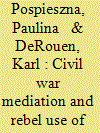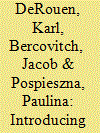|
|
|
Sort Order |
|
|
|
Items / Page
|
|
|
|
|
|
|
| Srl | Item |
| 1 |
ID:
153626


|
|
|
|
|
| Summary/Abstract |
Violence against civilians is portrayed as an antecedent of civil war, a cause, or both. Civil war creates opportune environments for planning and carrying out these acts that in turn can have detrimental effects on peace processes. Since not all civil war factions will see peace as beneficial, some actors may use violence to undermine the peace talks. The rebels may use indiscriminate violence to demonstrate their ability to exact costs on the government thus forcing the latter to negotiate. This article focuses upon acts of violence committed by rebel groups during mediated peace process. The central hypothesis is that violence against civilians increases the probability of mediation that in turn increases the prospects for violence. Using all civil war episodes from 1970 to 2008 as observations results from bivariate probit analysis endogenizing the choice of mediation bear out this theoretical argument.
|
|
|
|
|
|
|
|
|
|
|
|
|
|
|
|
| 2 |
ID:
172687


|
|
|
|
|
| Summary/Abstract |
This article explicates the intertwined economic and political goals behind the imposition of countersanctions through an analysis of their premises and outcomes for Russia’s domestic economy. The evidence supports the argument that retaliation was designed to benefit the Russian domestic food industry, reorient trade relations, and bolster domestic public support for this sector while politically penalizing sanctioning countries. An important contribution of this article is to demonstrate how sanctions imposed on nondemocratic target countries, which play an important role in international affairs, is like a tit-for-tat game, which may have additional effects and also unintended political, economic, and social consequences not yet observed.
|
|
|
|
|
|
|
|
|
|
|
|
|
|
|
|
| 3 |
ID:
107659


|
|
|
|
|
| Publication |
2011.
|
| Summary/Abstract |
Mediation is one of the few mechanisms the international community can deploy that will affect civil wars. This article introduces the dataset on mediation in civil wars - termed the Civil War Mediation (CWM) dataset. This is the first dataset to focus solely on civil war mediation. These data contribute to the present state of quantitative research on mediation in three important respects: the data are collected for the period of 1946-2004, are organized by mediation cases and by civil war episode, and provide detailed information about mediation incidences. The article first presents a few variables included in the dataset that are motivated by theoretical arguments from the literature. After a presentation of summary statistics, attention is turned to using the CWM data to explore the determinants of mediation. Mediation is shown to be a function of war type (territorial and internationalized wars are more likely to be mediated), war duration (the longer the war the higher the probability of mediation), supply-side factors (the number of democracies in the world and the global polity average), and stratum (subsequent wars are less likely to be mediated). Battle-related deaths also seem to increase the chances of mediation, though the relationship is only weakly significant. The article concludes with suggestions for future research that can benefit from the dataset.
|
|
|
|
|
|
|
|
|
|
|
|
|
|
|
|
| 4 |
ID:
170354


|
|
|
|
|
| Summary/Abstract |
This article analyses activists’ attitudes towards using social media for civic actions in authoritarian and democratising countries. Specifically, it examines whether civic activists in Belarus and Ukraine perceive social media as ‘liberation technology’ or as unhelpful and overhyped, a ‘net delusion’. We compare the ways in which civic activists use social media for the purpose of spreading information, networking and mobilisation. We find that social media is used by them for civic activism in order to campaign for civil and political liberties in their countries. Civic activists are generally enthusiastic about the use of social media, however we highlight challenges arising from socio-political conditions as well as negative consequences of activists’ online engagement.
|
|
|
|
|
|
|
|
|
|
|
|
|
|
|
|
| 5 |
ID:
187250


|
|
|
|
|
| Summary/Abstract |
This article examines a new phase in democracy promotion in Central and Eastern European countries that recently have faced the process of shrinking civic space and democratic backsliding. In our case study, we analyse systematically the voices and strategies of Polish NGOs involved in democracy promotion at home and abroad as a response to these new challenges. Our empirical findings suggest that advocacy NGOs devoted to democratic quality and sustainability can continue their mission and promote or defend democracy, albeit with new incentives, strategies and goals that also depend on the existing political opportunity structures. The threat of shrinking civic space, paradoxically, has mobilized NGOs in Poland to strengthen their mission and resources, and seek wider support in society. This was possible due to new response strategies in three major areas of their operation: access, funding and networking. Understanding these actions has immediate policy implications, as it can help actors who are seeking to support democracy figure out how to play a more supportive role.
|
|
|
|
|
|
|
|
|
|
|
|
|
|
|
|
|
|
|
|
|